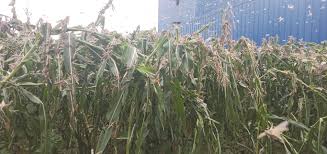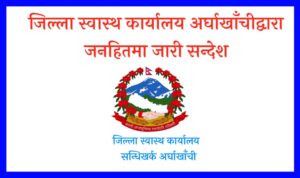SHARING:
Kathmandu, July 19: Locust swarms, which entered Nepal a week ago, have damaged crops and fruits, mainly in Surkhet and Pyuthan districts.
According to Ram Krishan Subedi, information officer of Plant Quarantine and Pesticide Management Centre, the second batch of locusts, which entered Nepal a week ago, had damaged crops and fruits mainly in two districts of Surkhet and Pyuthan.
A technical team of local levels reported that the locusts damaged maize and mango grown in around 1,100 hectares of land of the two districts, he said, adding that no actual data of losses was received from them.
The first batch of locusts was seen in Nepal on June 13, and they damaged crops around in around 1,118 hectares of land in different six districts.
“The loss caused by the second batch of locust is comparatively higher than the first batch of the insects. The locusts got a chance to damage crop in Surkhet and Pyuthan as two districts did not receive rainfall,” he said.
Three locust swarms entered Nepal in two days on July 12 and July 15. A group of locusts entered Nepal via Dang and another two groups via Mahendranagar and Nepalgunj.
The group of locust swarms went to Pyuthan from Dang and damaged maize crops in different areas—Swargadwari Municipality and Pyuthan Municipality of Pyuthan district, said Subedi, who is also focal person of Locust Information Centre established at the Plant Quarantine and Pesticide Management Centre.
He said that they have mobilised the technical team to collect actual data of losses caused by the locusts but they could not receive information of actual data.
Likewise, the locusts have damaged mango garden and maize of Surkhet district.
As per the information received from locals, there was no significant loss by locusts in other districts except for Puythan and Surkhet districts.
Locust swarms are still flying in different areas of Surkhet district as the locusts did not go away even locals tried to chase them by producing noise beating utensils.
However, the locusts which reached Pyuthan from Dang went to mountain area, so there was no need to be worry about further damage crops, he said. Rising Nepal





